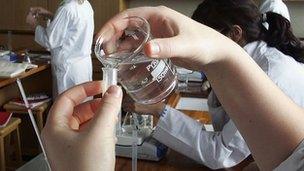Charity calls for state to pay fees at private schools
- Published

The Sutton Trust says that until the mid-1970s places at many private schools were essentially state funded
The state should help fund places for bright children from poor backgrounds at the best private schools, an education charity has said.
Sir Peter Lampl, chairman of the Sutton Trust, said leading independent schools should be fully open to pupils whose parents cannot afford the fees.
He advocated a revival of a grant scheme to subsidise fees at day schools which was abolished in the 1970s.
But a government spokesman said its priority was to improve state schools.
Sir Peter said that more than two-thirds of places at independent day schools were essentially state funded until 1976 when the direct grant scheme was abolished.
He told BBC radio: "Now the only people who can go to these schools are people who can afford fees, which can be £12,000 a year for a day school.
"So what we are saying is that all the places are available based on merit."
Sir Peter said a study by his charity showed that the majority of people in top jobs in the media, politics, the law and medicine had attended independent day schools.
The report said the current system wasted talent, was unfair and economically damaging to the nation.
Sir Peter said the Sutton Trust had funded a seven-year pilot scheme at an independent girls school in Liverpool.
'A happy school'
During the period, Belvedere School took the brightest pupils, with free places for the third of pupils with a family income of less than £15,000.
The other parents paid fees on a sliding scale, depending on their means.
Sir Peter said: "Academic standards at the school went up and it was a happy school. No-one really cared whether your father was a barrister or a bar tender."
As parents were sharing the fees, the cost to the charity was less than the cost to government of funding a state school place, he said.
He said 16 other top independent day schools were willing to take part in further pilots if the government put up the money to subsidise the fees.
"We are talking about some very famous schools: Manchester Grammar, King Edward's School, Birmingham and City of London who say 'We would love to be able to take 100% of our pupils on merit,'" he said.
A spokesman for the Department for Education welcomed Sir Peter's contribution to the debate on better educational opportunities but said this was not an idea the government was considering.
- Published11 July 2011
- Published8 July 2011